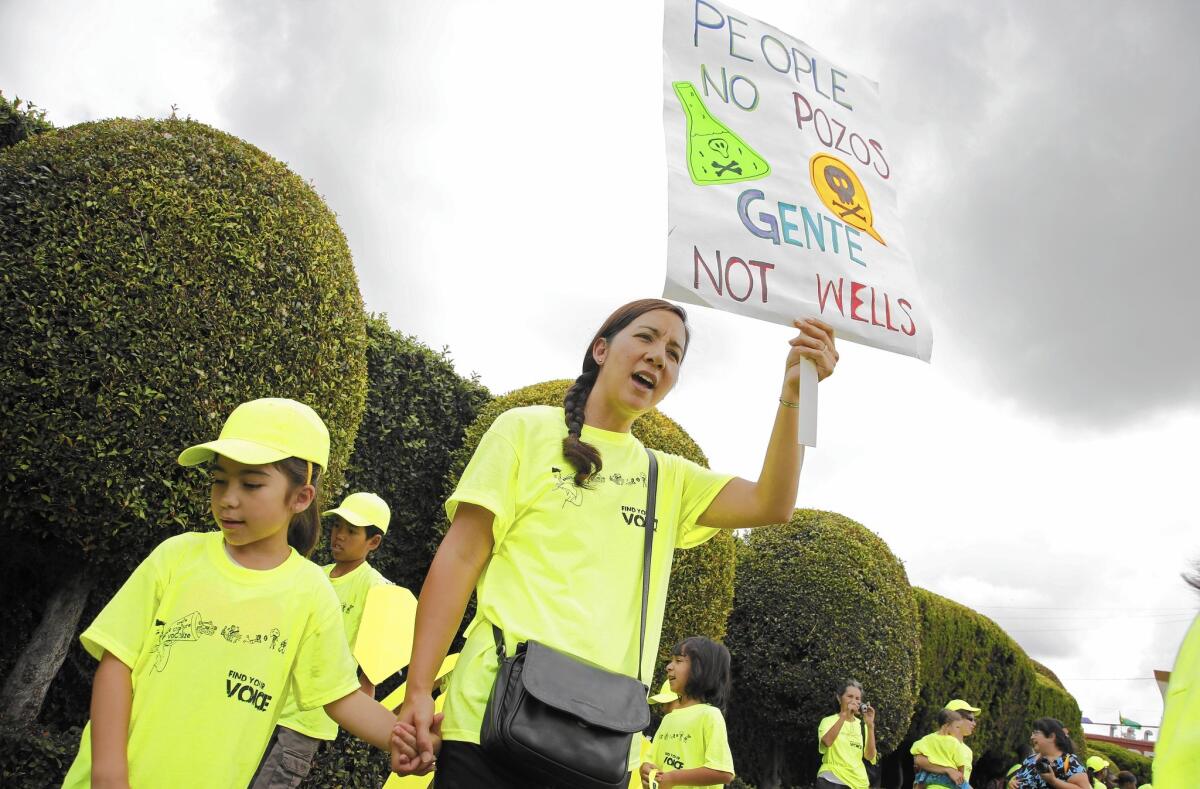South L.A. residents resist oil firm’s plans to burn gas at drilling site

Lisa Placenti, right, and Isabella Placenti, 7, participate in a protest last month against oil drilling in their South Los Angeles neighborhood.
- Share via
In South Los Angeles, residents are battling an oil company that has been a longtime neighbor, resisting its plans to burn off excess gas at its West Adams Boulevard drilling site.
Freeport-McMoRan, which operates the site, says an enclosed burner is needed as a backup method to dispose of unused gas that is pulled from the earth along with the oil. It has told neighbors and the city that the equipment will make little noise, take up little space and produce “near zero emissions.”
But community residents are challenging the plan, arguing that it is wasteful to burn gas that could create electricity. And they are pressing for the city to scrutinize the environmental effects of drilling at the site — with or without the new burner.
As the oil company and residents wait for a city zoning administrator to decide whether the burner should be allowed, the piece of equipment has become a flashpoint for tensions over neighborhood drilling.
Los Angeles is a big city atop big oil: 70% of its active oil wells are within 1,500 feet of homes or “sensitive uses,” such as schools or hospitals, according to the Liberty Hill Foundation. And drilling is even closer to such places in South L.A. and Wilmington than in other parts of the city, a Community Health Councils Inc. study found.
Michael Salman, a West Adams neighborhood resident who opposes the proposal, said the burner would be a form of “pure pollution” because it produces exhaust without “any beneficial use” for the gas, such as cooking dinners, heating homes or generating power.
“That should be unacceptable anywhere, but it is far worse in the middle of a densely populated neighborhood, immediately adjacent to apartments and a health clinic,” Salman said in an email.
He and other residents note the World Bank is campaigning against such “routine flaring” and are prodding the company to pursue environmentally friendly alternatives, such as using the gas to power fuel cells. Freeport-McMoRan counters such alternatives would end up being more disruptive to the neighborhood because new infrastructure would have to be installed. And its spokesman, Eric Kinneberg, said the World Bank campaign was irrelevant to its South L.A. plans because the burner would have “negligible” emissions.
No matter how low the emissions, however, the burner is “not making any good use of the gas,” said Jack Brouwer, associate professor of mechanical and aerospace engineering at UC Irvine, after learning about the planned project. “It may have features that do produce lower emissions than a typical flare, but it essentially is a flare.”
At a recent neighborhood meeting, Carolina Ixta told the crowd in Spanish that she sometimes struggles to sleep because of strange smells from the drilling site nearby. She and other residents say the city should demand more environmental review of the site, whether or not the burner is installed.
NEWSLETTER: Get the day’s top headlines from Times Editor Davan Maharaj >>
Freeport-McMoRan says an environmental review is unnecessary because the equipment has “minimal impacts” and is being installed to continue existing activities. It says the new equipment would not increase the amount of gas processed at the West Adams facility, but serve as a backup for existing microturbines that use gas to produce electricity, providing “operational redundancy.”
But neighborhood residents complain the oil company has offered up a string of different explanations, leaving them skeptical the equipment is merely a backup. Many worry the new burner could pave the way to expand drilling there and at another nearby site, by sharply increasing the amount of gas the company could manage.
Salman noted that, in an application sent to city planners last year, Freeport-McMoRan wrote that microturbines now on the site, which convert the gas into electricity, were inadequate to manage the added gas that would be generated once more wells authorized years ago went into production.
He and other residents argue the company has shifted its explanations to “piecemeal” its plans, breaking them up into smaller changes to avoid stricter environmental review. And they worry another burner could be on its way, pointing to emails between a project representative and the city that mention space for a second burner that might be needed in the future.
Freeport-McMoRan told The Times it has “no present or future plans” to permit a second burner. It argues it hasn’t changed its story, but simply provided more detailed information.
With the two sides at loggerheads, City Council President Herb Wesson, who represents the area, says he opposes installing the burner unless residents and the oil company can reach an agreement, according to his spokeswoman, Vanessa Rodriguez. The city administrator is expected to make a decision within a month or two.
emily.alpert@latimes.com
Twitter: @LATimesEmily
ALSO:
Wildfire burns 300 acres and 3 structures in Castaic area
Racial slur against San Francisco tech entrepreneur spurs Twitter outrage
Fire blazing through Montebello grows to 200 acres; eastbound 60 Freeway reopens
More to Read
Sign up for Essential California
The most important California stories and recommendations in your inbox every morning.
You may occasionally receive promotional content from the Los Angeles Times.











